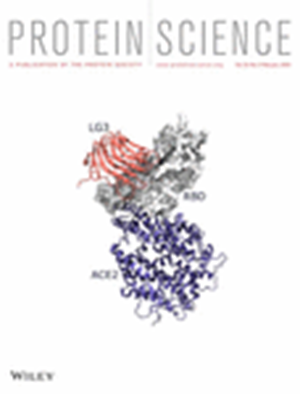Engineering and physicochemical characterization of a novel, stable, symmetric bispecific antibody with dual target‐binding using a common light chain
IF 4.5
3区 生物学
Q1 BIOCHEMISTRY & MOLECULAR BIOLOGY
引用次数: 0
Abstract
Bispecific antibodies (BsAbs) have emerged as a major class of antibody therapeutics owing to their substantial potential in disease treatment. While several BsAbs have been successfully approved in recent years, ongoing development efforts continue to focus on optimizing various BsAbs tailored to particular antigens and action mechanisms, aiming to achieve favorable physicochemical properties. BsAbs generally encounter challenges due to their unfavorable physicochemical characteristics and poor manufacturing efficiencies, highlighting the need for optimization to achieve reliable productivity and developability. Herein, we describe the development of a novel symmetric BsAb, REGULGENT™ (N‐term/C‐term), comprising two Fab domains, using a common light chain. The heavy chain fragment encoded two antigen‐binding determinants in one chain. The design and production of REGULGENT™ (N‐term/C‐term) are simple owing to the use of the same light chain, which does not induce heavy and light chain mispairing, frequently observed with the asymmetric BsAb format. REGULGENT™ (N‐term/C‐term) exhibited high expression and low aggregation characteristics during cell culture and stress treatment under low pH conditions. Differential scanning calorimetric data indicated that REGULGENT™ molecules had high conformational stability, similar to that of stabilized monoclonal antibodies. Surface plasmon resonance data showed that REGULGENT™ (N‐term/C‐term) could bind to two antigens simultaneously and exhibited a high affinity for two antigens. In summary, the symmetric BsAb format of REGULGENT™ confers its desirable IgG‐like physicochemical properties, thus making it an excellent candidate for commercial development. The findings demonstrate a novel BsAb with substantial development potential for clinical applications.一种新型、稳定、对称的双特异性抗体的工程设计和理化表征--利用共同的轻链实现双目标结合
双特异性抗体(BsAbs)因其在疾病治疗方面的巨大潜力,已成为一类主要的抗体疗法。近年来,一些双特异性抗体已成功获得批准,但目前的开发工作仍侧重于优化各种针对特定抗原和作用机制的双特异性抗体,以获得良好的理化特性。BsAbs 通常因其不利的理化特性和较差的生产效率而面临挑战,这凸显了进行优化以实现可靠的生产率和可开发性的必要性。在本文中,我们介绍了一种新型对称 BsAb--REGULGENT™(N-term/C-term)--的开发过程,它由两个 Fab 结构域组成,使用一条共同的轻链。重链片段在一条链中编码了两个抗原结合决定簇。由于使用相同的轻链,REGULGENT™(N-term/C-term)的设计和生产非常简单,不会出现不对称 BsAb 格式中经常出现的重链和轻链错配现象。REGULGENT™ (N-端/C-端)在细胞培养和低 pH 条件下的应激处理中表现出高表达和低聚集特性。差示扫描量热数据表明,REGULGENT™ 分子具有很高的构象稳定性,类似于稳定的单克隆抗体。表面等离子共振数据表明,REGULGENT™(N-端/C-端)可同时与两种抗原结合,并对两种抗原表现出很高的亲和力。总之,REGULGENT™ 的对称 BsAb 格式具有类似 IgG 的理想理化特性,因此是商业开发的绝佳候选产品。研究结果表明,这种新型 BsAb 具有巨大的临床应用开发潜力。
本文章由计算机程序翻译,如有差异,请以英文原文为准。
求助全文
约1分钟内获得全文
求助全文
来源期刊

Protein Science
生物-生化与分子生物学
CiteScore
12.40
自引率
1.20%
发文量
246
审稿时长
1 months
期刊介绍:
Protein Science, the flagship journal of The Protein Society, is a publication that focuses on advancing fundamental knowledge in the field of protein molecules. The journal welcomes original reports and review articles that contribute to our understanding of protein function, structure, folding, design, and evolution.
Additionally, Protein Science encourages papers that explore the applications of protein science in various areas such as therapeutics, protein-based biomaterials, bionanotechnology, synthetic biology, and bioelectronics.
The journal accepts manuscript submissions in any suitable format for review, with the requirement of converting the manuscript to journal-style format only upon acceptance for publication.
Protein Science is indexed and abstracted in numerous databases, including the Agricultural & Environmental Science Database (ProQuest), Biological Science Database (ProQuest), CAS: Chemical Abstracts Service (ACS), Embase (Elsevier), Health & Medical Collection (ProQuest), Health Research Premium Collection (ProQuest), Materials Science & Engineering Database (ProQuest), MEDLINE/PubMed (NLM), Natural Science Collection (ProQuest), and SciTech Premium Collection (ProQuest).
 求助内容:
求助内容: 应助结果提醒方式:
应助结果提醒方式:


